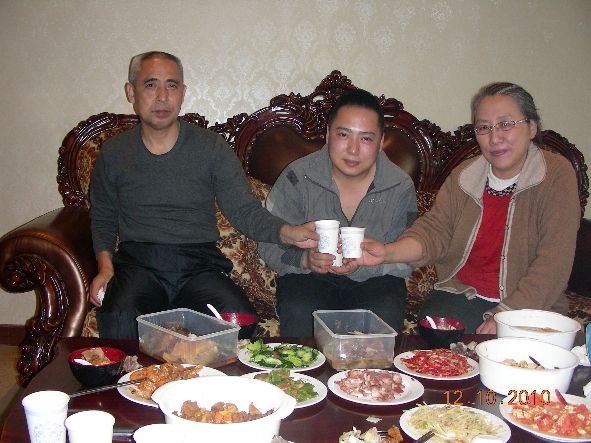| Radio Free Asia |
| April 30, 2015 |
| Washington DC |
 |
|
| Hada (L) shares a meal with son Uiles (C) and wife Xinna (R) in a file photo. |
Chinese authorities in Inner Mongolia have refused an application by ethnic Mongolian dissident Hada and his son for a passport, to travel overseas to seek medical attention, he told RFA on Thursday.
Veteran rights activist Hada, 60, was released from extrajudicial detention in December, four years after his 15-year jail term for "separatism" and "espionage" ended, with numerous health conditions developed during his sentence.
Hada, who suffers from systemic atherosclerosis and liver disease and other conditions he says are a result of years of corporal punishment and abuse in prison, was informed by officials in his home city of Hohhot that they had declined his application for a passport, he said on Thursday.
"I am seriously ill, and I want to go overseas to seek medical treatment, but the colonial authorities won't issue me with a passport," Hada told RFA. "This is against domestic laws and international law."
"I call on the United Nations to urgently help me to resolve the problem of my passport so I can leave the country to get treatment," he said.
Hada was released by Chinese authorities to a police-owned apartment last November, after spending four years in extrajudicial detention at the Jinye Ecological Park in the regional capital Hohhot, after serving a 15-year jail term for "separatism" and "espionage."
But police told him they would only take care of his income and accommodation if he stopped speaking to foreign journalists and promised not to sue the authorities over his treatment, which he has refused to do.
Son urges pressure campaign
His son Uiles called on the international community to put pressure on the Chinese government to issue his father with a passport for humanitarian reasons.
"The passport was declined on the basis of clause 13, section 7 of the Passport Law of the People's Republic of China," Uiles said.
The clause states that a passport may be refused in cases where "the competent department of the State Council is of the opinion that the exit will cause harm to national security or significant damage to the national interest."
Hada on Thursday penned an open letter to the United Nations Human Rights Council and the U.N. Commission Against Torture, slamming his treatment at the hands of the ruling Chinese Communist Party.
"The colonial authorities continue to insist that I drop my ideas if I want to have enough to eat, or medical attention," Hada wrote.
"With no other options left, I thought I could seek medical attention overseas, but they have refused to issue me with a passport," he said.
"We are citizens, and it is our right to be issued with passports."
"They wouldn't even give my son a passport, which is to judge him guilty by association ... This lawless and random behavior is indistinguishable from the criminal acts of the Cultural Revolution," Hada wrote.
Threatened with homelessness
Overseas Mongolians have been raising funds online to help Hada, who has been threatened with homelessness if he continues to speak out about his treatment in prison, where he has described being tortured and held in solitary confinement for months on end.
Japan-based ethnic Mongolian Tie Mulun said he was "extremely angry" to hear that Hada had been denied a passport.
"I would like to express the strongest protest at this trampling of a citizen's rights by the Chinese government," Tie said.
"They have slandered him, saying he is a separatist and other such crimes, and he has already been locked up by them for 19 years," he said.
"During those 19 years, he suffered serious persecution that affected him mentally and physically," Tie said. "It should be a matter of course that someone in his situation is able to leave the country to seek medical help."
"They should take humanitarian concerns into consideration," he said.
Activists who complain about China's human rights record to the U.N. have been 'disappeared,' detained and otherwise persecuted, rights groups say.
Campaign groups have told the U.N. that the torture and mistreatment of inmates and detainees is now endemic throughout the country's judicial and law enforcement system.
While China ratified the U.N. Convention Against Torture in 1988, there is scant sign that it is being implemented in courts, prisons or police-run detention centers, and the deprivation of medical treatment is a "commonly used" form of torture by neglect, rights groups say.
In March 2014, activist Cao Shunli died after she was denied treatment for a number of medical problems during police detention, after the authorities rejected family and lawyers’ requests for medical bail over a period of five months.
Reported by Qiao Long for RFA's Mandarin Service. Translated and written in English by Luisetta Mudie.





 Beyond
Great Walls: Environment, Identity, and Development on the Chinese
Grasslands of Inner Mongolia
Beyond
Great Walls: Environment, Identity, and Development on the Chinese
Grasslands of Inner Mongolia China's
Pastoral Region: Sheep and Wool, Minority Nationalities, Rangeland
Degradation and Sustainable Development
China's
Pastoral Region: Sheep and Wool, Minority Nationalities, Rangeland
Degradation and Sustainable Development The
Ordos Plateau of China: An Endangered Environment (Unu Studies on
Critical Environmental Regions)
The
Ordos Plateau of China: An Endangered Environment (Unu Studies on
Critical Environmental Regions)